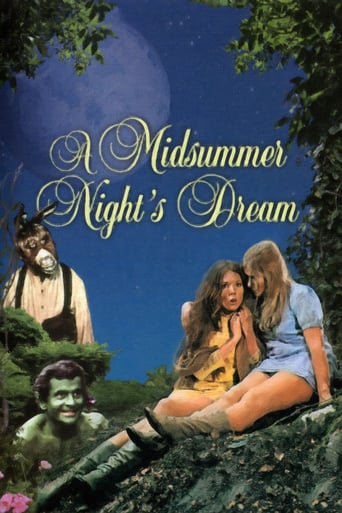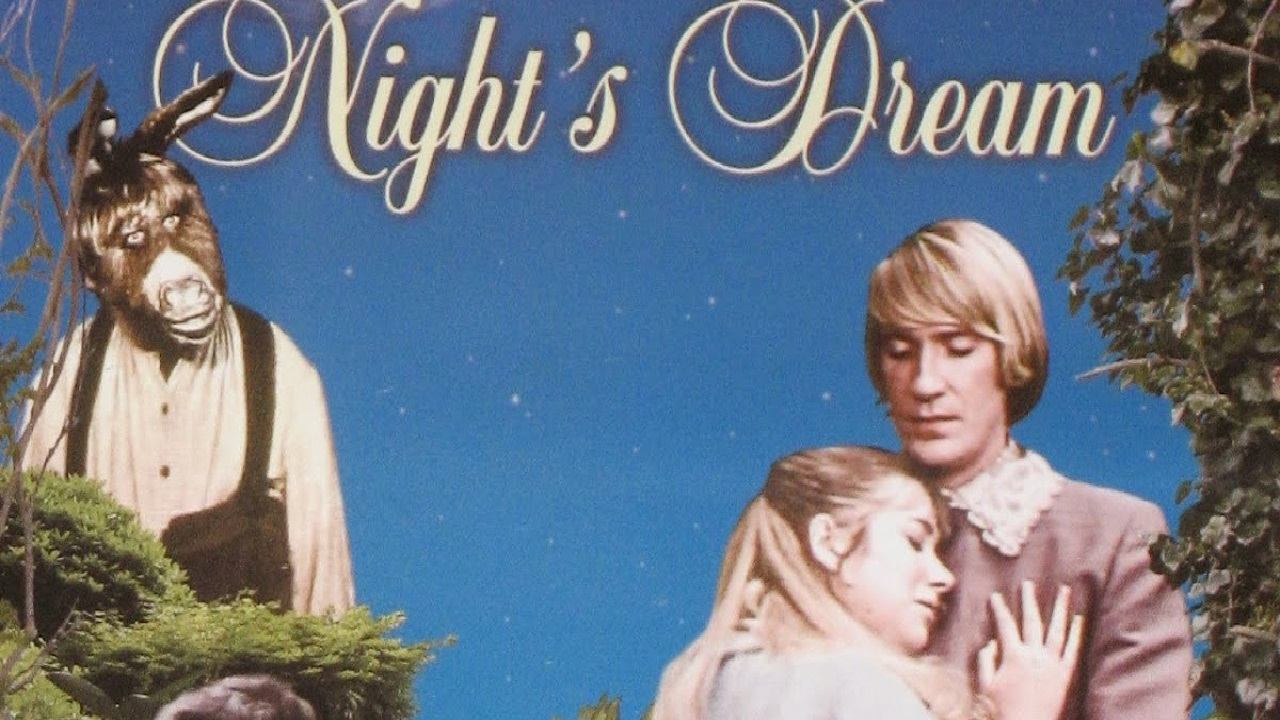gelman@attglobal.net
I saw this film in streaming video from a print that looks as if it had been decaying in somebody's dank basement for the past 40 years. The color was washed out, lacking depth. But this Royal Shakespeare Theatre Company production, directed by Peter Hall, contains amazing performances by Diana Rigg, Helen Mirren and Judi Dench (as Helena, Hermia and Queen Titania) when all three were young and beautiful but already capable of displaying the talent that subsequently carried them to fame. Ian Richardson as Oberon and Ian Holm as Puck are also outstanding, as is Paul Rogers as Nick Bottom, the weaver. Despite the poor quality of the film itself, you will surely wait a lifetime to see a version of Midsummer Night's Dream in which Helena and Hermia are dominant players, and you may never see a Titania as sexy as gorgeous or as outright sexy as Judi Dench. The entire play-within-a-play by the "rude mechanicals" is as good as any I've ever seen, and Rogers is marvelous as Bottom.
oshram-3
I'll come right out and say it not everything Shakespeare ever wrote is a gem that needs to be enshrined forever. What's more, most movies of Shakespeare plays are even worse; they're either faux-stagey, as if the actors wish you to keep in mind that this is Shakespeare, for God's sake, or they go the other way and become overly artsy. I only own a few on them on disc (Ken Branagh's Much Ado and Henry V, where the tongue-twisting dialogue flows so effortlessly it appears to be ad-libbed), as most of the versions I have encountered are artless train wrecks; even Orson Welles' Othello is to my mind wince-worthy.I tried this version out solely because Diana Rigg was in it. Granted, so was the rest of the Royal Shakespeare Company circa 1968, an impressive list (Ian Holm, David Warner, Helen Mirren, Judi Densch, etc.); and this is a difficult play to do well because its plot is so hoary, and the play-within-the-play so tedious, that these actors can hardly be held accountable for the bard's sins.Not that they don't make enough of their own, however. Central to the film's weakness is that it can't figure out its own identity. There is a stab at period costume here and there, but then Rigg shows up in suede go-go boots (not to mention Queen Hippolyta in a leather dress and thigh boots). The story is set in Athens, but the landscape (at least they didn't use a soundstage) is Tudor England, as are whatever costumes attempt to be period (the period of Shakespeare, not Athens). The film takes place almost wholly outside, which is a relief, but unlike, say, Branagh's Much Ado, which takes advantage of some gorgeous Tuscan landscape, most of the time here we are treated to some non-descript copses of trees. Add to that budgetary problems Puck, Oberon, and gang appear as green-tinted hippies, with their faces not even matching the hue of their bodies and you have a production that is easier to laugh at than with.Most of the actors give it their all, but most of them appear miscast. Rigg is far too old and worldly for the dopey Helena, and Derek Godfrey's Theseus seems more like a baron in some Russian novel (though admittedly I kept getting distracted by his helmet-head bouffant). You'll see a lot more of Judi Densch than you ever wanted to, as her costume amounts to green paint and teeny pasties. I did like Warner's Lysander, who appeared the most natural of the four young lovers, and Ian Holm's Puck, but it's impossible not to enjoy a Holm performance.I tend to think Shakespeare movies tell you more about the period when they are made rather than when they are set (much like the plays themselves), and this one is no different. Part old school, part hippie romp, the film unintentionally reflects the chaos of the late sixties, of a cultural shift, or wanting to take something classic and make it new but unfortunately having no idea how. The end result is a lurching effect, its low budget and low-tech seeming impossibly crude to viewers used to spectacles such as Lord of the Rings (even Xena's make-up jobs would make these look silly). It's interesting as a novelty piece to look at where Shakespeare presentations were, and where they were aiming to be, four decades ago; certainly we have a different emphasis now, as actors forty years from now will no doubt reinterpret the bard in their own fashion (android Iago?). For all but a die-hard fan of any of the regulars or of Shakespeare's work, though, this film is a pass. It did, however, help shed light on why a talented actress who was part of the Royal Shakespeare company for many years is chiefly remembered for judo kicks and leather catsuits.
Bologna King
This movie looks like it was hastily committed to film by high school students. The lighting changes constantly so one is never sure whether the scene is intended to be at night or during the day. The fairies appear to be various shades of green at different times. The lovers get muddier and muddier as the story progresses, and the stains migrate around their clothes and faces. The sound is exactly the same wherever the action is. There is a frequent use of jerky stop action to move the scene from place to place and to show fairies moving at the speed of light. The dreadful music is earnestly trying to be avante-garde and succeeding in being cacophonous and out-of-place. The costumes were trendy then but look rather silly now.The virtually uncut script, an advantage for students, has the disadvantage of occasionally slowing the action to a near stop.It's a pity because these are great performances by an amazingly talented cast. Helen Mirren's Hermia, less strident than most, Ian Holm's doglike Puck and Judi Dench's near naked Titania are standouts certainly. Best of all for me was Derek Godfrey as Theseus. He brings a lot of dignity and urbanity to a part often played as a pompous bore or a chump. Theseus is given a lot of lines, sadly cut in many productions, which comment on literature and drama. "The best of this kind are but shadows, and the worst no worse, if imagination amend it." You need a fair bit of imagination to amend the shortfalls of this film, but the effort is well worth it.
baker-9
Yes, it's clear that director Peter Hall was influenced by Richard Lester in his filming of Shakespeare's classic comedy/fantasy: the hand-held camera, jump cutting, etc. And while one could quibble with some of his derivative directorial choices, there's no arguing that this is the best-acted "Dream" on film available.There's hardly a weak link in the cast, with the exception of David Warner and Michael Jayston as the male half of the quartet of lovers. Warner is a skilled classical actor, but he never had an ounce of charm. Jayston is competent, but dull and colorless.But the rest of the cast is marvelous, with special kudos to Helen Mirren, Diana Rigg, Ian Richardson, and Judi Dench as a very sexy Titania. Ian Holm's snake-tongue bit as Puck gets old, but his somewhat malevolent rendition of Puck is well done.I'm surprised that no one has made more out of Paul Rodgers superb Bottom, by far the best I've ever seen on stage or screen. Unlike so many actors who broadly overplay the role to wring laughs, Rodgers plays Bottom completely straight and with total conviction - never descending to self-conscious comedic playing. And he's all the more hilarious for it. This Pyramus and Thisbee playlet at the end is the funniest ever.


 AD
AD


